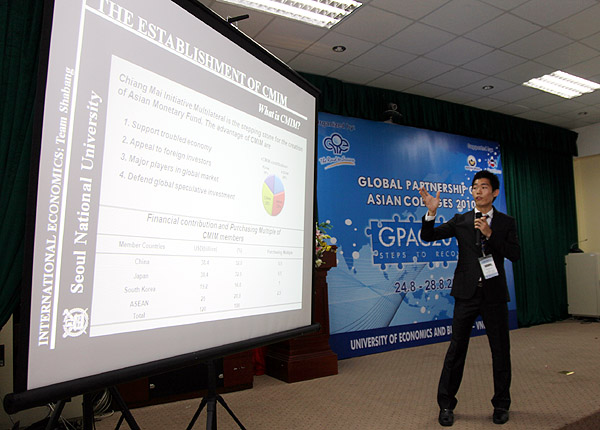
Student presents their paper at GPAC 2010 held in Hanoi for the first time
GPAC 2014 is held in Hanoi by the University of Economics and Business - Vietnam National University, Hanoi from 24 to 29 August.
GPAC stands for Global Partnership of Asian Colleges, was initiated in 1991 by Professor Min Sang Ki (College of Business Administration of Seoul National University) and Professor Haruo Shimada (Department of Economy of Keio University).
GPAC is held annually with the participation of many Asian famous universities such as: National Chengchi University (Taiwan), Meio University, Keio University and Chiba University of Commerce (Japan), Seoul National University (Korea), College of Management Academic Studies (Israel) and Vietnam National University, Hanoi - University of Economics and Business (Vietnam). With its reputation, many students and teachers from prominent Asian colleges have been attracted.
History of GPAC
|
Year
|
Activity
|
|
1991
|
1st Student Conference
|
|
2002
|
National Chengchi University (Taiwan) and Meio University (Japan) joined GPAC
|
|
2007
|
17th Student Conference/ Location: Taipei, Taiwan
|
|
2010
|
20th Student Conference/ Location : Hanoi, Vietnam
|
|
2011
|
21th Student Conference/ Location: Taipei, Taiwan
|
|
2012
|
22th Student Conference/ Location: Seoul, South Korea and Israel College of Management-Academic Studies joined GPAC
|
|
2013
|
23th Student Conference/ Location: Okinawa, Japan
|
|
2014
|
24th Student Conference/ Location: Hanoi, Vietnam
|
The topic of GPAC 2014:
The topic of GPAC 2014 is “Sustainable Development in Asia: Economics growth and Environment management”. GPAC is an international academic conference which students from prominent Asian colleges actively discuss, present and share their own views on some certain global issues, such as:
1. Macro Economics
2. International Finance
3. International Trade
4. Business Administration
5. Environment Economics
6. Labor Economics
In 2014, Vietnam once again received the honor of hosting the 20th GPAC with the key role of the University of Economics and Business, Vietnam National. This year's program will connect and promote the mission of the GPAC:
- Exchange and discuss on issues related to academic economics in Asia and the world
- Exchange culture, explore and experience the beauty of a mixture of traditional and modern of Vietnam as well as the country members.
- Strengthen the partnerships between the university members, and expand relations between students and teachers; become a cultural bridge, knowledge sharing between countries.
The attraction of the GPAC 2014
- Have attracted more than 150 researchers, teachers and outstanding students from 8 universities in Asia.
- Focus on the discussion and reach practical solutions for the academic issues related to sustainable economic and environmental protection.
- Promote research and academic exchange among young people, is the bond between the Vietnam’s and other countries’ young scientists.
- Promote the personal development of young leaders in Asia; create opportunities to improve thinking skills and the ability to argue, to understand the roles and responsibilities of themselves for the sustainable development of each country.
- Raise awareness of the society in particular and the participants in general on issues of sustainable development and protecting the environment.
- Trade and exchange culture among students of Vietnam, Korea, Japan, Israel; affirm Vietnam's cultural beauty to international friends; provide opportunities for students to learn more, get acquainted with the national identity of each country, thereby narrowing the gap common culture.
- Explore and experience the ecotourism programs and special cultural tourism in Vietnam only.
- Provide opportunities for students to experience educational exchange programs in an international environment within Vietnam.
- Consolidate and potential strength training of Vietnam education; confirm the impact of Vietnam on the forums in the world and the region.
- Develop the brand of country and people of Vietnam. This event is also the opportunity to introduce the land, people, culture, society and the development potential of Vietnam to international friends; attract foreign investment flows into Vietnam.